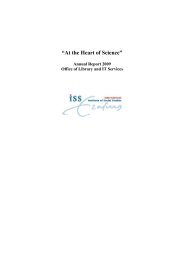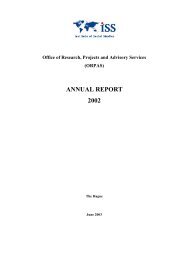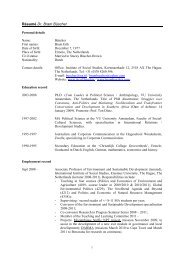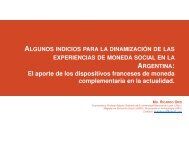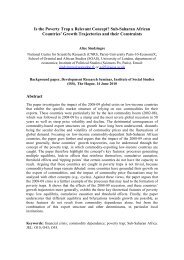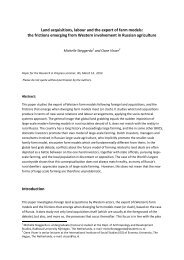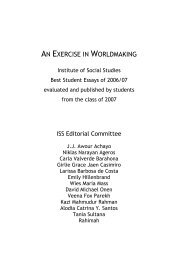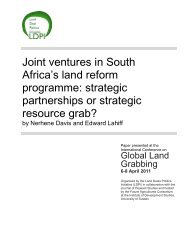AN EXERCISE IN WORLDMAKING 2009 - ISS
AN EXERCISE IN WORLDMAKING 2009 - ISS
AN EXERCISE IN WORLDMAKING 2009 - ISS
Create successful ePaper yourself
Turn your PDF publications into a flip-book with our unique Google optimized e-Paper software.
112 ISABELLE TURCOTTE<br />
regarding the nature and definition of ‘informality,’ the concept has<br />
largely evolved, reflecting a myriad of local and regional experiences with<br />
production and working relationships beyond the realm of recognized, regulated<br />
and registered employment. At the national level, the interpretation of<br />
informality has largely driven the kinds of interventions states initiate to<br />
encourage changes in the domestic labor market. These interpretations<br />
heavily fall on the interests of the protagonists of political and economic<br />
life with future policy formulation being anchored on these particular<br />
interests. This essay draws a link between the process by which the formation<br />
of institutions defines the macro policies that drive political, economic<br />
and social relationships, by which a society may interpret the existing<br />
reality of informality. As such, a translation of interests into policy<br />
will allow us to view how interventions have affected the dimensions of<br />
the informal economy in contemporary Colombia.<br />
DEF<strong>IN</strong><strong>IN</strong>G <strong>AN</strong>D <strong>IN</strong>TERPRET<strong>IN</strong>G <strong>IN</strong>FORMALITY<br />
Since the early 1970s, the conceptualization of informality has been central<br />
in academic and policymaking circles to analyze the linkages between<br />
domestic relations of production, employment, growth and expressions<br />
of marginality. With marked flows of urbanization, changes in industrial<br />
production and growing differences in education and skill attainment,<br />
the labor market segmented in such a way that more and more individuals<br />
resorted to production outside of formal recognition, regularization<br />
and protective covenants, differentiating ‘informal’ workers and occupations<br />
from the masses of public and private ‘formal’ sector workers. The<br />
prominence and expansion of informality in most cities brought scholars<br />
to articulate conceptual definitions so as to draw links between these<br />
workers and their inherent connection or disconnection from state institutions<br />
that provide the parameters to affect policy formulation regarding<br />
the labor market.<br />
The discussion on the informal economy can be loosely divided into<br />
three periods, the first focusing mostly on characterizing the workers,<br />
their activities and the economic factors affecting the development of<br />
urban economic linkages; the second drawing attention to the construction<br />
of institutions, and the role of power and politics in affecting the<br />
capacity and access of entrepreneurs to required capitals and inputs for<br />
production; and the third concentrating on the access to capital or legal<br />
recourses that change the nature of enterprise and labor relations. In or-



